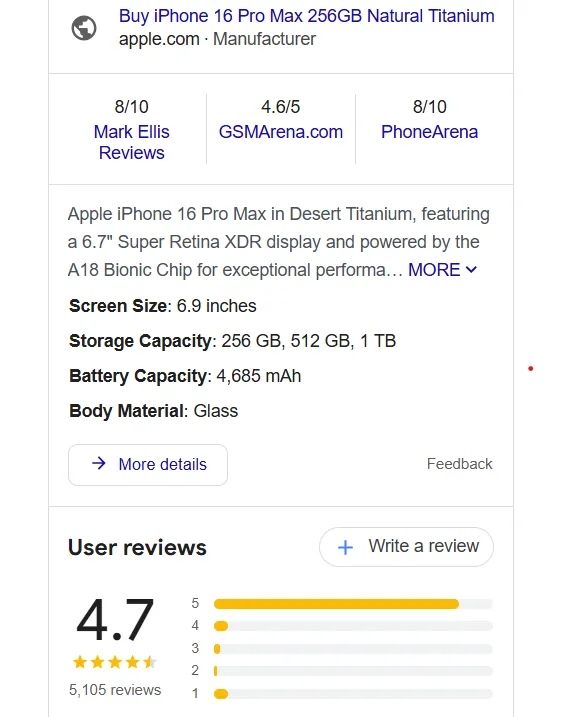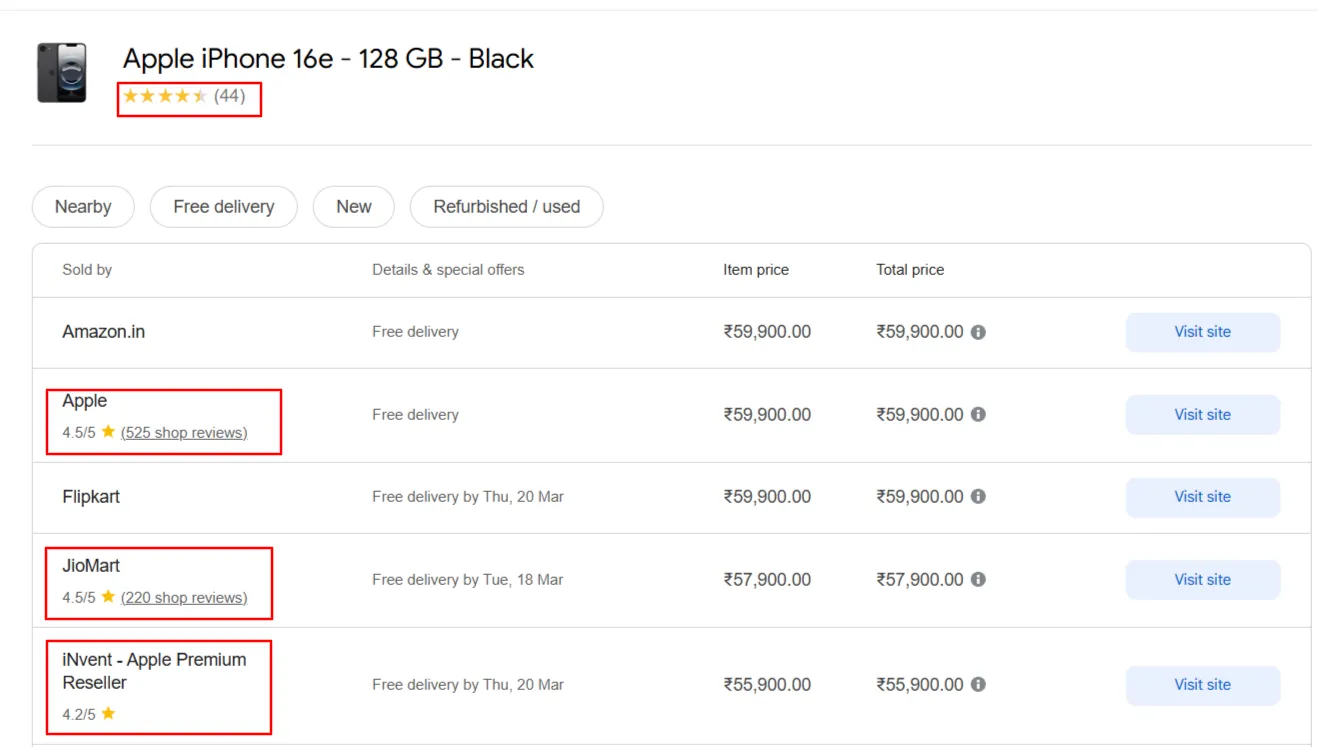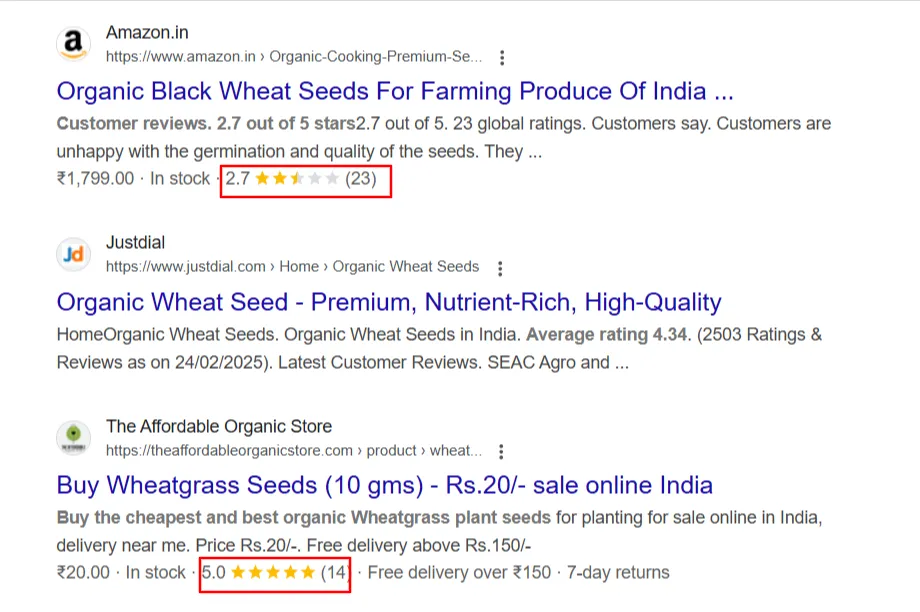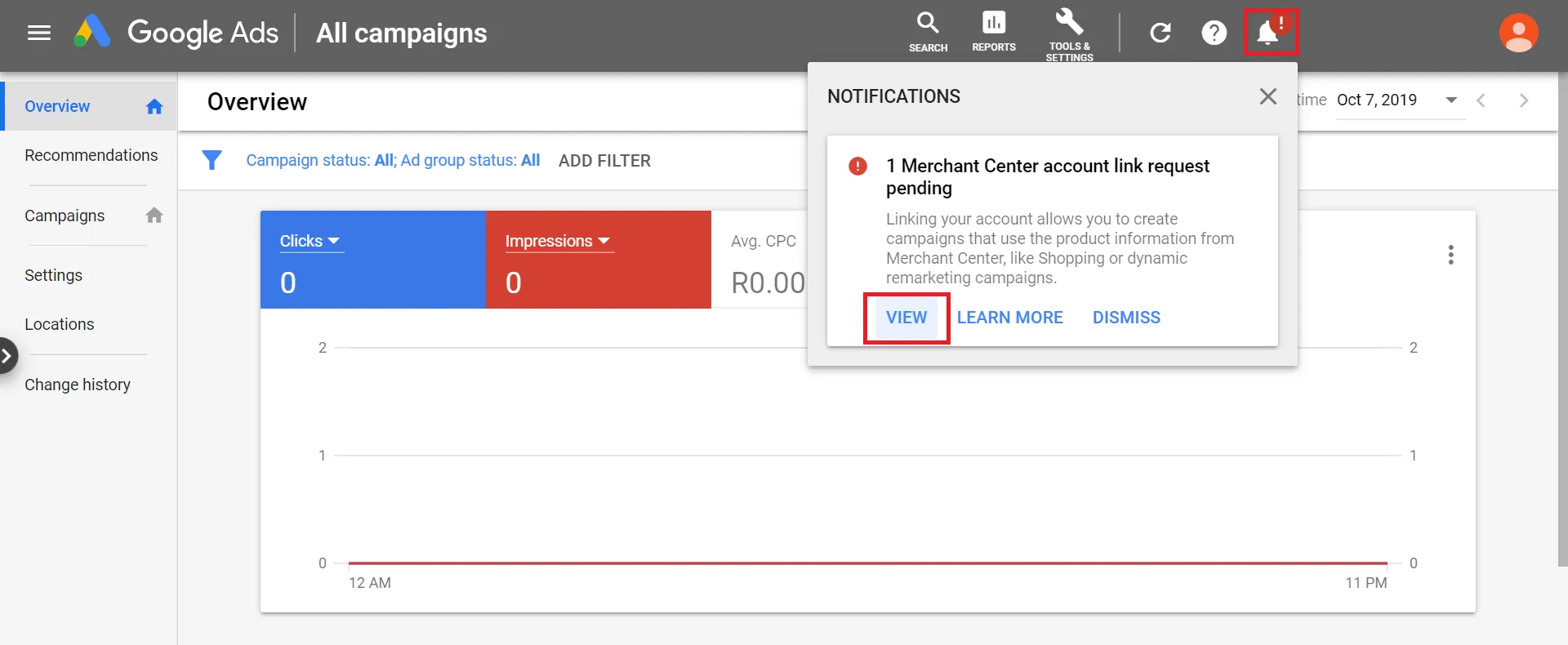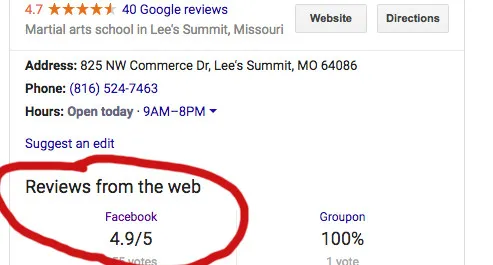Ever noticed little golden stars with ratings for a business or product in a rich snippet when you search on Google?
They might seem small, but they hold a massive influence over whether people choose to click, visit, or buy.
Did you know that businesses with a 4.5+ star rating get clicked on nearly 70% more than those with lower ratings?
Think about it—when was the last time you booked a restaurant, bought a gadget, or picked a service without checking the business star rating first? Exactly.
Google Star Ratings are like a digital trust signal for potential customers, influencing their opinions and purchasing decisions in seconds.
But how does it work? Why is it important? Most importantly, what mistakes should be avoided while implementing the plan?
Stick around because we’re breaking it all down.
What Exactly Is a Google Star Rating?
Google Star Rating or Google Star Snippet is a numerical rating (from 1 to 5 stars) that appears on Google Search, Google Maps, and Google Business Profiles to represent customer feedback and previous performances for businesses, products, and services.
You can see star ratings for various Google search results including paid ads, rich results like recipe cards, book/movie reviews, local pack listings, standard blue link listings, third-party review sites, and app store results.
These ratings help users quickly assess the quality of a business based on previous customer experience.
Google’s 5-Star Scale and Its Meaning:
⭐ 1 Star – Worst
⭐⭐ 2 Stars – Poor
⭐⭐⭐ 3 Stars – Average
⭐⭐⭐⭐ 4 Stars – Good
⭐⭐⭐⭐⭐ 5 Stars – Excellent
But Where Do Google Star Ratings Appear?
- Google Business Profile (GBP): Ratings for businesses listed on Google.
- Google Shopping: Product ratings are aggregated from multiple sources.
- Google Search Results: Google Rich Snippets show star ratings for products, services, and businesses.
- Google Play Store & Google Reviews: Ratings for apps, books, and services.
How Do the Google Star Ratings Work? – Find Review Score
Ever wondered how Google decides how many stars to show for a business? It’s not just a random number; it’s based on a mix of customer reviews, Google’s algorithm, and some behind-the-scenes math.
People rate a business based on their experience when they leave a review.
What next?
- First, Google understands structured data added to your page
- Then, Google averages out all the ratings to determine the overall star score in search results.
But there’s a catch: it doesn’t update instantly. It can take up to two weeks for new reviews to update your business’s new rating in Google rich snippet.
Google also customizes the review process based on the type of business. For example, plumbers might have options like “Install faucet” or “Repair toilet” to give more specific feedback. And allow businesses to add their custom service options to make reviews more relevant.
Now, not every review is counted the same way. If a customer chooses not to rate a specific aspect of a business, that part just doesn’t factor into the average. Google calculates the final review score or star rating by dividing the number of positive ratings by the total number of ratings (excluding the ones left blank).
Why Is Your Google Star Rating Important?
Imagine searching for a local coffee shop or a handyman—what’s the first thing you notice? The star rating. Those little stars instantly tell customers whether a business is worth their time (and money). Studies show that 57% of consumers won’t even consider a business with less than 4 stars.
But it’s not just about appearances; your Google Review Stars have a real impact on your business.
Here’s how?
- More Visibility in Search Results: Google favors highly-rated businesses, meaning a better rating can push you higher in search rankings and help you appear in the coveted Local Pack.
As per Google, “Rotten Tomatoes added structured data to 100,000 unique pages and measured a 25% higher click-through rate for pages enhanced with structured data, compared to pages without structured data.”
- Influence Buying Decisions: When customers see your 4.5-star rating next to a competitor’s no-rating presence, who do you think they’ll trust more? In fact, higher-rated businesses attract more leads and conversions.
- Boost Click-Through Rates (CTR) & Traffic: Listings with star ratings get significantly more clicks, driving more potential customers to your website.
As Google found, “The Food Network has converted 80% of their pages to enable search features, and has seen a 35% increase in visits.”
- Build Trust & Credibility: A high rating acts as social proof, assuring potential customers that your business is reputable and reliable.
- Boosts Revenue: The higher your rating, the more people are willing to spend. A Harvard Business School study found that a 1-star increase in ratings can lead to a 5-9% boost in revenue.
Curious about all the different types of Google-rich snippet star ratings and how they show up on search pages?
How To Get Star Ratings In Google Search Results for Your Business
If you want those eye-catching stars to appear next to your business in search results, you need to know how Google Star Ratings work for different types of listings. Google doesn’t just hand out star ratings automatically—each type of result has its own process.
Let’s break it down:
1. Google Review Stars on SERP Results (Organic Listings)
Having star ratings appear in organic search results can make your website stand out from competitors and boost your click-through rate (CTR). When users search for something like “best apple pie recipe”, they’re more likely to click on a result with visible star ratings than one without.
However, Google only shows star ratings for certain types of content, like products, services, and reviews.

So, how can you get these Google Star Ratings to show up in search results? Follow these steps:
Step 1: Collect Customer Reviews
Before Google can display star ratings, your website needs actual reviews. Encourage your customers to leave detailed and authentic reviews on your website, Google Business Profile, and third-party review platforms.
- Ask satisfied customers to leave feedback.
- Use follow-up emails or incentives (like discounts) to encourage reviews.
- Display reviews prominently on your website.
Step 2: Implement Schema Markup
Review schema markup is structured data that helps Google understand and display your review ratings in search results. By adding the right schema (such as Review, AggregateRating, or Product schema), you can tell Google to pull and show star ratings.
- Use Review Schema for individual reviews.
- Use the AggregateRating Schema for overall ratings.
- Make sure the markup follows Google’s guidelines.
Step 3: Add the Code to Your Website
Once you’ve structured your data correctly, you’ll need to embed the schema markup code into your website’s HTML.
This code should indicate:
- Average rating
- Highest rating
- Lowest rating
- Total review count
If you’re not comfortable with coding, you can use Google’s Structured Data Markup Helper or plugins (if using WordPress or Shopify).
Step 4: Test Your Markup
After implementing schema markup, you need to check if it’s working correctly. Google provides two tools for this:
- Google’s Rich Results Test: Checks if your structured data qualifies for rich search results.
- Schema Markup Validator: Validates schema.org markup, even beyond Google’s requirements.
Simply enter your URL or code snippet, and these tools will show whether your structured data is correctly formatted.
Adding Google Star Rating to your search results can significantly increase your website’s visibility and credibility.
However, Google doesn’t guarantee that ratings will appear; it depends on compliance with their guidelines and the relevance of your content.
2. Google Star Ratings on Paid Ads (Google Ads)
If you’re running Google Ads, you’ve probably noticed some ads stand out more than others—thanks to star ratings. These seller ratings appear below your ad text, making your business look more trustworthy and enticing to potential customers.
Google doesn’t automatically add these ratings to your ads; they must be earned through verified customer reviews.
Here’s how you can get Google Review Stars on your paid ads:
Step 1: Collect Reviews from Trusted Sources
To qualify for seller ratings, Google requires businesses to gather reviews from verified sources. Reviews must be collected through:
- Google Customer Reviews
- Approved third-party review platforms (e.g., Trustpilot, Yelp, Facebook)
- Google Play Store (for apps) or Google Merchant Center (for eCommerce businesses)
You need at least 100 verified reviews from customers in a single country over the past 12 months, with an average rating of 3.5 stars or higher.

As you can see in the above image, Google Ads shows the rating for one product that has more than 100 reviews and a 3.5+ score.
Step 2: Link Your Reviews to Google Ads
Once you’ve collected enough reviews, Google will automatically pull seller ratings into your Google Ads account.
However, make sure:
- Your Google Ads and Google Merchant Center accounts are linked (for eCommerce businesses).
- You’ve opted into Google Customer Reviews (if applicable).
- Your business is using a Google-approved review platform.
Step 3: Maintain a High Star Rating
Just having 100+ reviews isn’t enough; your average rating must be 3.5 stars or higher. Google dynamically updates seller ratings, so a drop in review quality could result in losing your star ratings.
- Consistently ask happy customers for reviews.
- Address negative reviews quickly to improve ratings.
- Monitor feedback and optimize your customer experience.
Step 4: Check If Your Seller Ratings Are Live
Wondering if your Google Star Ratings or rich snippets are showing on your ads? Use the Google Ads Seller Ratings Tool to check:
- Go to Google Ads Extensions > Automated Extensions
- Look for “Seller Ratings”
- Alternatively, use this URL format to check (by replacing yourwebsite.com with your domain):
https://www.google.com/shopping/ratings/account/lookup?q=yourwebsite.com
If your ratings aren’t showing, check whether you have enough verified reviews and meet Google’s eligibility criteria.
3. Google Star Rating on Local Search Results (Google Business Profile)
For local businesses, star ratings appear in Google Maps and local search results based on reviews from Google Business Profile (GBP). This is one of the most visible and influential star ratings for businesses like restaurants, stores, and local service providers.
Here’s how to get those stars to show up:
- Claim & Optimize Your GBP Listing: Ensure accurate business details, categories, and high-quality images.
- Collect More Reviews: Encourage happy customers to leave authentic Google reviews. Share direct links and respond to all feedback. Also, link reviews from 3rd party authentic review platforms to your GBP profile, as Google also shows these ratings in results.
- Maintain a High Rating: Aim for 4.0+ stars by providing excellent service and addressing negative feedback professionally.
- Monitor & Manage Reviews: Regularly check and respond to reviews, as Google considers review quality, quantity, and recency for ranking.
A well-managed Google Star Rating can boost local SEO, attract more customers, and increase trust—so start collecting those reviews today!
Take control of your Google Star Ratings with SocialPilot’s Reviews Tool!
- Collect More Reviews with targeted Review Campaigns.
- Automate Responses using AI-powered replies.
- Showcase Reviews with the SocialPilot Review Widget.
- Manage Ratings & Reviews across platforms and multiple locations—all from a single dashboard!
Streamline your review strategy and build a stronger online presence effortlessly!
4. How to Get Star Ratings on App Store Results?
For businesses whose core product is a mobile app, success heavily depends on downloads from the App Store and Google Play Store. But before users even click on your listing, they often see the Google star rating system right from the search engine results pages (SERPs).
These review rating snippets usually show the total number of reviews, app price, and other key details to help potential users decide whether your app is worth downloading.

To improve your app’s visibility in Google Search with star ratings, follow these steps:
Step 1: List your app on the Apple App Store and Google Play Store with a well-optimized description.
Step 2: Encourage users to leave reviews and ratings after positive interactions.
Step 3: Engage with customer feedback—respond to reviews to improve trust and credibility.
Step 4: Improve app performance—higher-rated apps are more likely to be featured with star ratings.
By actively managing your app’s reputation and gathering authentic reviews, you increase the chances of Google displaying your app’s star ratings in search results—boosting clicks, installs, and credibility.
Common Mistakes To Avoid With Google Star Ratings
- Buying or faking reviews: Google may penalize you. Always focus on real customer feedback.
- Ignoring multiple platforms: Star ratings vary across Google Maps, Yelp, etc. So, you need to maintain consistency across platforms.
- Not responding to reviews: Engaging with customers builds trust and encourages more feedback.
- Inconsistent service quality: Ensure steady service to maintain a strong SERP snippet rating.
- Incomplete Google Business Profile: Fully optimize GBP profile and other review platform listings to boost visibility and credibility online.
- Expecting instant updates: Your star rating in the Google snippet may take up to two weeks to refresh, so be patient.
- Ignoring customer feedback: Use reviews to identify issues and make improvements.
- A sudden spike in reviews: Google may flag it. Encourage reviews gradually and naturally.
- Ignoring negative reviews: Address concerns professionally to maintain your reputation.
- Chasing a perfect rating: A realistic, honest review rating is more trustworthy than a flawless (5/5) one.
Conclusion
Google Star Ratings influence trust, visibility, and clicks making them essential for any business. Whether they appear in organic search, ads, or local listings, these ratings can attract customers, improve SEO, and boost conversions.
And the best part? It only takes a few simple steps to get your Google review stars displayed.
Start by optimizing your Google Business Profile and actively collecting positive reviews to improve your chances of earning visible star ratings.
Want to showcase your best reviews on your website? The SocialPilot Review widget makes it effortless to collect and display authentic Google reviews, helping you build trust and drive more conversions.
Try it today!

